Papers by Oluwasogo ADEDIRAN
International Journal of Energy Economics and Policy, Apr 17, 2016

The Palgrave Handbook of Agricultural and Rural Development in Africa
Africa’s agricultural transformation through large-scale agricultural land investments (LALIs) ai... more Africa’s agricultural transformation through large-scale agricultural land investments (LALIs) aims at increasing production; create employment opportunities, and enhance infrastructure development. After years of ‘experimentation’ and incentives to investors to boost this transformation process, the expected transformation has not translated adequately to increased job opportunities for the active population, particularly the youth. This study engages the Living Standard Measurement Study-Integrated Surveys on Agriculture (LSMS-ISA) to provide empirical insights to this disconnect. Using the Tanzania case study, the study shows that the occurrence of LALIs has not effectively delivered on its expectations of employment creation for the youths mainly influenced by the framework and capacity of indigenous institutions. The chapter presents some recommendations on how informal institutions and local capacity can be harnessed to ensure that LALIs create youth employment opportunities in Tanzania.

Heliyon
To "end poverty in all its forms everywhere" and "reduce inequality within and among countries", ... more To "end poverty in all its forms everywhere" and "reduce inequality within and among countries", this study aligns with the 2030 Sustainable Development Goals 1 and 10. It uniquely contributes to the growth-poverty-inequality discourse by using per capita consumption expenditure growth (poverty), Gini index (inequality) and GDP growth (economic growth). It is a comparative analysis of 58 Sub-Saharan Africa (SSA) and Latin American (LAC) countries (from 2000 to 2015) to determine whether economic growth reduces the incidence of poverty and if its interaction with income inequality enhances or alters its impact on poverty. Consistent findings from a multianalytical approach using pooled ordinary least squares, fixed effects and system GMM reveal that: (1) economic growth exhibit poverty-reduction properties; (2) the growth rate of inequality intensifies poverty, (3) inequality aggravates the impact of growth on poverty, and (4) the growth-poverty-inequality trilemma differs across income groups and regional samples. Furthermore, this study submits that the interaction of income inequality dampens the positive impact of economic growth on the incidence of poverty and supports the argument that the extent of inequality lessens the effect of inclusiveness. Hence, income inequality is a crucial determinant of poverty. Policy implications are discussed.
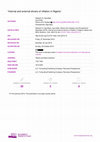
Banks and Bank Systems
This study contributes to the literature on inflation dynamics by examining whether internal or e... more This study contributes to the literature on inflation dynamics by examining whether internal or external factors drive inflationary pressure in Nigeria. Using the annual time series data from 1981 to 2017 and applying Johansen cointegration analysis, the vector error correction mechanism and the impulse response function, the study reveals some compelling evidence to suggest that external forces are responsible for inflationary pressure in Nigeria. The results, amongst others, reveal that: external drivers – exchange rate, imported inflation and openness – induce a positive and direct relation to inflation. This is because a percentage change in these variables results in an increase in inflation of 0.49%, 0.47% and 4.28%, respectively, on average, ceteris paribus; the internal drivers – government expenditures, net food exports and lending interest rate – dampen inflation by 0.48%, 1.70% and 0.02%, respectively, on average, ceteris paribus; there is evidence of cointegration indica...
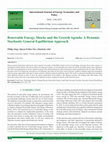
The study investigates the direction of causal relationships among emissions, energy consumption ... more The study investigates the direction of causal relationships among emissions, energy consumption and economic growth in Nigeria using annual time series data for the period 1970-2013. The Johansen maximum likelihood cointegration tests indicate an existence of a unique cointegrating vector, and the normalized long run estimates shows that fossil fuel enhances carbon emissions whereas, clean energy source (electricity) mitigate the atmospheric concentration of carbon dioxide (CO 2) emissions. Similarly, the Wald exogeneity Granger causality test indicates an existence of unidirectional causation running from fossil fuel to CO 2 emissions and gross domestic product (GDP) per capita. Alternatively, non-fossil energy (electric power) causes more proportionate change in GDP per capita but our result could not establish any causal link between electric power and carbon emissions. Finally, charting a channel towards ensuring sustainable environment and economic development involves a progr...

The study investigates the direction of causal relationships among emissions, energy consumption ... more The study investigates the direction of causal relationships among emissions, energy consumption and economic growth in Nigeria using annual time series data for the period 1970-2013. The Johansen maximum likelihood cointegration tests indicate an existence of a unique cointegrating vector, and the normalized long run estimates shows that fossil fuel enhances carbon emissions whereas, clean energy source (electricity) mitigate the atmospheric concentration of C0 2 emissions. Similarly, the Wald exogeneity Granger causality test indicates an existence of unidirectional causation running from fossil fuel to C0 2 emissions and GDP per capita. Alternatively, non-fossil energy (electric power) causes more proportionate change in GDP per capita but our result could not establish any causal link between electric power and carbon emissions. Finally, charting a channel towards ensuring sustainable environment and economic development involves a progressive substitutability of clean energy sources for fossil consumption.

Cogent Economics & Finance
The Nigerian economy attracts abundance of foreign capital inflows and credit supply; hence, an a... more The Nigerian economy attracts abundance of foreign capital inflows and credit supply; hence, an adverse external credit shock might lead to a large decrease of external inflows due to global credit tightening, which may leave the domestic economy in deep recession. In this case, domestic monetary policy tools should be preferred to mitigate the external adverse effect on the domestic economy and stimulate investment. As a result, an important issue of concern in this study is how can the use of monetary policy tools mitigate the effect of external credit shocks on economic growth in Nigeria? In answering this question, this study attempted to assess the influence of monetary policy tools on external credit and economic growth nexus in Nigeria, using annual data covering 36 years for the period 1980-2015. The study adopted the Cobb-Douglas production function and estimated a specified model using autoregressive distributed lag cointegration approach. The study found out that cash reserve requirement, which is credit policy easing, is significant in growing the Nigerian economy, as compared to monetary policy rate. The implication of this is that, if credit policy easing is properly implemented, it could be efficient in offsetting adverse external credit shocks.

Until recently,.Jhe last decade has witnessed massive economic growth in Nigeria, but the literat... more Until recently,.Jhe last decade has witnessed massive economic growth in Nigeria, but the literature has proved that the growth has not been inclusive in nature. This is because, in spite of the level of growth recorded overtime, the poverty rate is still very high. This study investigates the relationship between human capital (education) and inclusive growth in Nigeria between the sample period of 1981 to 2013. The Johansen co-integration me_thod and Error Correction Mechanism (ECM) were adopted. The result reveals that human capital has a positive and significant long run relationship with inclusive growth in Nigeria. While, it showed a negative and significant relationship for public capital expenditure on education and a negative, it was not having significant relationship with public recurrent expenditure and education. The study however suggest that, f or the Nigerian economy to maximise the benefits from human capital and public expenditure on education, the government must ...

The Nigeria economy attracts abundance of foreign capital inflows and credit supply, as a result,... more The Nigeria economy attracts abundance of foreign capital inflows and credit supply, as a result, an adverse external credit shock might bring a large decrease of external inflows due to global credit tightening, which may leave the domestic economy in deep recession. In this case, monetary policy tools may be preferred to stimulate investment. However, an important issue of concern in this study is, how does monetary policy mitigate the effect of external credit shocks on economic growth in Nigeria? Hence, in answering this question, it was imperative for the study to assess the influence of monetary policy on external credit and economic growth nexus in Nigeria. Using annual data covering thirty-six years for the period 1980-2015. The study adopted the neoclassical growth model and estimated the model using Autoregressive Distributed Lag (ARDL) approach. The study expressed that cash reserve requirement, which is credit policy easing is significant in growing the Nigerian economy,...
Banks and Bank Systems, 2019
ARTICLE INFO Ngozi Adeleye, Adeyemi A. Ogundipe, Oluwatomisin Ogundipe , Ifeoluwa Ogunrinola and ... more ARTICLE INFO Ngozi Adeleye, Adeyemi A. Ogundipe, Oluwatomisin Ogundipe , Ifeoluwa Ogunrinola and Oluwasogo Adediran (2019). Internal and external drivers of inflation in Nigeria. Banks and Bank Systems, 14(4), 206-218. doi:10.21511/bbs.14(4).2019.19 DOI http://dx.doi.org/10.21511/bbs.14(4).2019.19 RELEASED ON Friday, 27 December 2019 RECEIVED ON Saturday, 20 July 2019 ACCEPTED ON Sunday, 20 October 2019

Journal of Money Laundering Control, 2021
Purpose This study aims to analyze the effect of banking technology [automated teller machine (AT... more Purpose This study aims to analyze the effect of banking technology [automated teller machine (ATM) and mobile cellular devices (MOBs)] and other traditional factors on the level of currency in circulation for a sample of 21 selected sub-Saharan African (SSA) countries. It also assessed the mitigating effect of education on the relationship between banking technology and the cashless economy. Design/methodology/approach The study used a panel data approach to design a cashless economy model with banking technology – ATM and MOBs – as well as their interaction with education as regressors. Findings This study finds that MOB is significant for promoting a cashless economy, whereas ATM is insignificant in sample SSA countries. The level of education and the number of bank branches were also found to be significant in promoting a cashless economy. The interaction between education and ATM was insignificant but negatively signed, whereas that between education and MOB was significant but...

The Journal of Internet Banking and Commerce, 2017
This study examined the effect of financial intermediation on economic growth in Nigeria. The stu... more This study examined the effect of financial intermediation on economic growth in Nigeria. The study period covered between 1980 and 2014. The introduction of financial intermediation by financial intermediaries in Nigeria was necessary due to the challenges, issues and limitations of the direct financing system. The unit root test was carried out using the Augmented Dickey-fuller and Philip-Perron tests in order to confirm the stationarity of the data, then the Johansen co-integration test was used to estimate the long run relationship between the dependent and independent variables in this study. The Vector Error Correction Model (VECM) test was conducted. The result showed that financial intermediation has a long-run relationship with economic growth in Nigeria. Therefore, the study recommended that the regulatory authorities of financial intermediaries such as the Central Bank of Nigeria (CBN), having obtained knowledge from this research work on the impact of financial intermedi...

This study analysed the response of the agricultural sector to the removal of subsidy on refined ... more This study analysed the response of the agricultural sector to the removal of subsidy on refined petroleum in Nigeria, given its strategic role as a critical sector. Using a dynamic energy-environment CGE model based on the 2006 Nigerian Social Accounting Matrix (SAM), the study presents the results of the response of the agricultural sector to three different simulation scenarios. These include a partial (50 percent), gradual and a one shot (complete) removal of subsidy on imported refined oil in Nigeria. The results provided evidence that a complete or one shot removal of fuel subsidy is more favourable in terms of better performance of the agricultural sector as many of the key macroeconomic variables increased under the complete removal simulation scenario. It is recommended that a one shot removal of fuel subsidy will strengthen the agricultural sector performance and outputs, even though prices will move up in the short term. The long term benefits to the sector when funds are...

The inflow of technology-based FDI into a country helps to develop the manufacturing sector which... more The inflow of technology-based FDI into a country helps to develop the manufacturing sector which brings about an increase in aggregate output which boosts economic growth. It is against this backdrop that this study examined the link between technology-based FDI, manufacturing output and economic growth in Nigeria and Malaysia, using the Vector Autoregression (VAR) model, pointing out the lessons Nigeria can learn from the Malaysian economy. The secondary data used in this study was obtained from the World Bank and the United Nations Conference on Trade and Development (UNCTAD) spanning between 1980 and 2017. The result from this study showed that Malaysia’s FDI inflows are directed towards the manufacturing sector than the Nigerian economy, and this explains why the Malaysian manufacturing sector is more developed than that of Nigeria. Therefore, the study recommended that Nigeria should direct FDI to the manufacturing sector, as this will boost the growth rate of the economy.
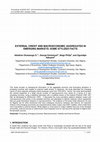
This study focuses on background information of the aggregate economy and fluctuating situations ... more This study focuses on background information of the aggregate economy and fluctuating situations in emerging countries with respect to external credit shocks. In particular, the study describes the changing nature of some selected emerging market business cycle from 1970-2015. Hence, the study demonstrated the cyclical properties of a large annual number of macroeconomic time series for a group of 6 (six) emerging countries, using a statistical technique with a modified version of the Hodrick-Prescott (1997; HP) filter as developed by McDermott (1997). It discussed the cross-correlation patterns between output and macroeconomic time series of the sampled countries and attempted to identify relatively robust regularities that can guide theoretical research in macroeconomics. The evidence of the study holds relevance not only for Nigeria, but for other economies that have undergone economic transition and reforms. An important finding is that emerging economies are characterized by hi...
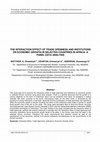
This study sets out to examine the interaction effect of trade openness and institutions on econo... more This study sets out to examine the interaction effect of trade openness and institutions on economic growth in selected African countries using panel data analysis. There is a general discourse that the growth of a country depends on the level of investment which can be achieved most times via engaging in trading activities with other countries of the world. International trade, on the other hand, is enhanced by the presence of strong institutions. It has been observed that the combination of trade openness and institutions affect the economic growth of African countries but which of the institutions when trade is carried on would boost growth more is the aim of this study. This study used secondary data of thirty-five African countries and employed the Least Square Dummy Variables (LSDV) and the Generalized Method of Moments (GMM) econometric techniques for estimation. The major finding of the study revealed that the interaction effect of trade openness, political and cultural inst...
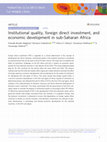
Humanities and Social Sciences Communications
Foreign direct investment (FDI) is regarded as a critical determinant in the concept of developme... more Foreign direct investment (FDI) is regarded as a critical determinant in the concept of development for Africa. However, institutional quality in the recipient countries is considered an essential factor that can be used to drive FDI flows inward. The study aims to establish the effect of institutions’ challenges on the FDI inflow and how it impacts on economic development for host selected countries in sub-Saharan Africa (SSA). The study employed pooled data for 30 SSA countries for the period within the years 2000 and 2018. The analysis method used was the fixed and random effect regression model utilized to estimate the effect of foreign capital on economic development with considerations for the quality of institutions for developing SSA sub-region of Africa. This study reveals that foreign capital inflow is crucial for economic development in the SSA sub-region of Africa. Quality of institutions as determining factors also affected the level of inflow of FDI to the host SSA sub...
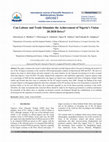
The paper examines the extent to which labour and trade can help Nigeria achieve the goal of atta... more The paper examines the extent to which labour and trade can help Nigeria achieve the goal of attaining the position of one of the 20 largest economies in the world by 2020 using descriptive analysis of data between 2009 and 2013. The aim is to analyze the extent to which labour and trade respond to the smart initiative by the Nigerian Government in its drive towards achieving Nigeria’s vision 20:2020. The paper adopted both comparative and exploratory approaches. Exports, imports, trade as a percentage of GDP and the unemployment rate figures in Nigeria were compared with those of Belgium, Poland, Saudi Arabia and Sweden that have been in contention for the 20 th largest economy since 2009. Though, the finding of this study revealed Nigeria is still lagging behind the other four contenders of the 20 th position, but has a lot of potentials to clinch the 20 th position before or by the year 2020 since she is presently regarded as one of the fastest growing economies in the world. The...
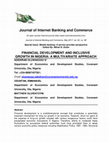
Financial development is a multidimensional concept that constitutes a potentially important mech... more Financial development is a multidimensional concept that constitutes a potentially important mechanism for long run growth in an economy. However, short-run gains at the expense of long-run growth coupled with various exogenous factors could have precipitated economic fluctuations in Nigeria. Therefore, efforts to moderate these fluctuations by successive federal authorities must have prompted them to adopt various economic policy measures including Stabilization Policy, 19811983, Structural JIBC May 2017, Vol. 22, No.S8 2 Adjustment Programe (SAP), 1986-1992; Medium Term Economic Strategy, 1993-1998 and the Economic Reforms 1999-2007, on the basis that such policy actions can engender economic growth in the long run. This was eventually the driving force behind various financial policy reforms in Nigeria. However, in spite of all these reforms, the associated problems that exist still include: inefficiency in the allocation of funds to the productive sectors, lack of long-dated fun...

The importance of monetary policy to an economy has made its effectiveness very potent in achievi... more The importance of monetary policy to an economy has made its effectiveness very potent in achieving economic growth in both developed and developing countries, this is because, an effective monetary policy is crucial for sustainable development and economic stability. Hence, this study will among other things investigate the relationship between monetary policy shocks and inclusive growth in Nigeria. With many of the macroeconomic models for measuring the effect of monetary policy on an economy lacking the analytical specificity to account for the importance of shocks on aggregate economy. This study, with the introduction of inclusive growth as a new variable, used a developed model with advanced empirical and quantitative methodology to study monetary policy shocks and inclusive growth in Nigerian economy. Usually, VAR is more applicable to analyzing the linkage among monetary policy variables. Hence, while this study will obtain a new evidence for this relationship, it is expecte...









Uploads
Papers by Oluwasogo ADEDIRAN